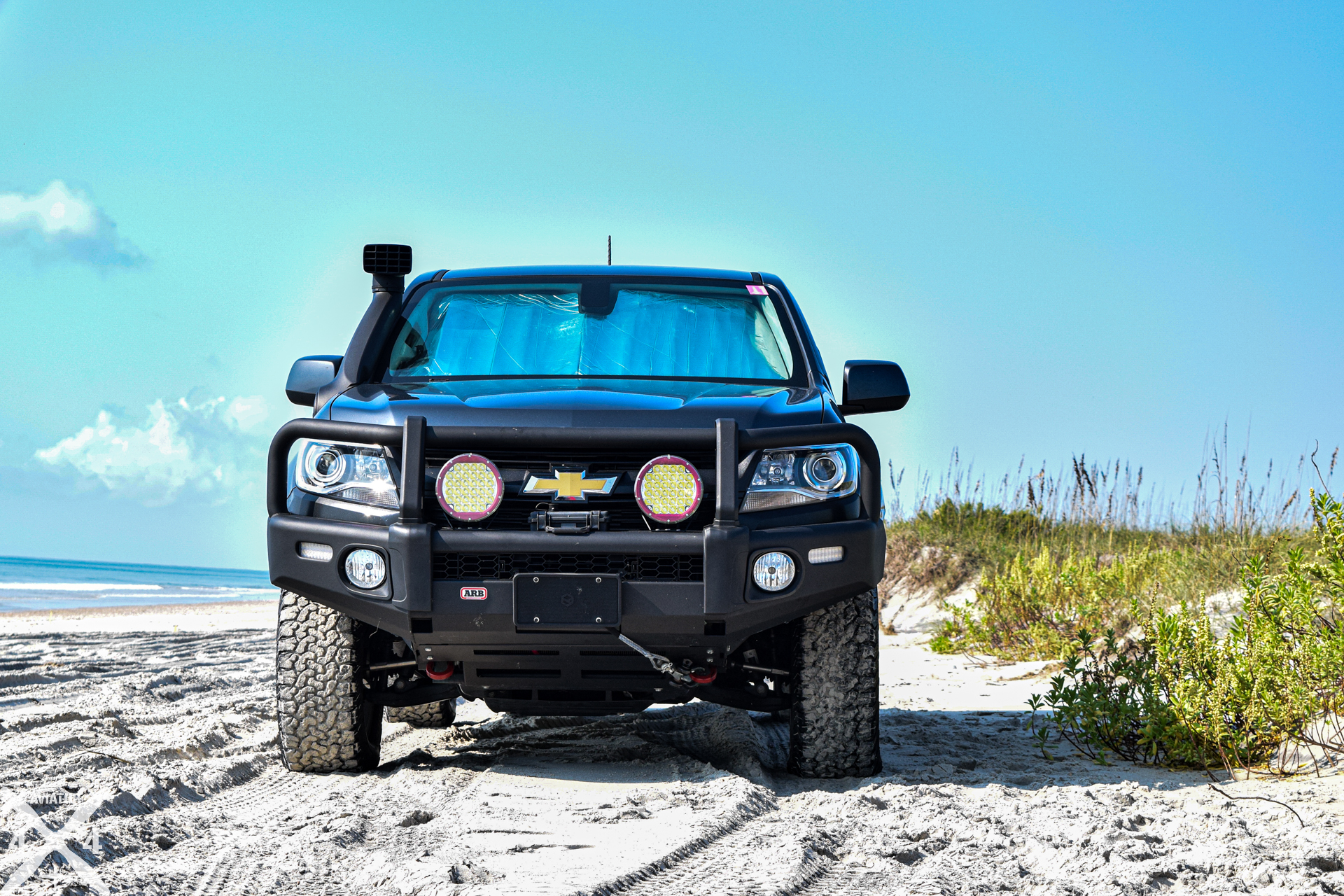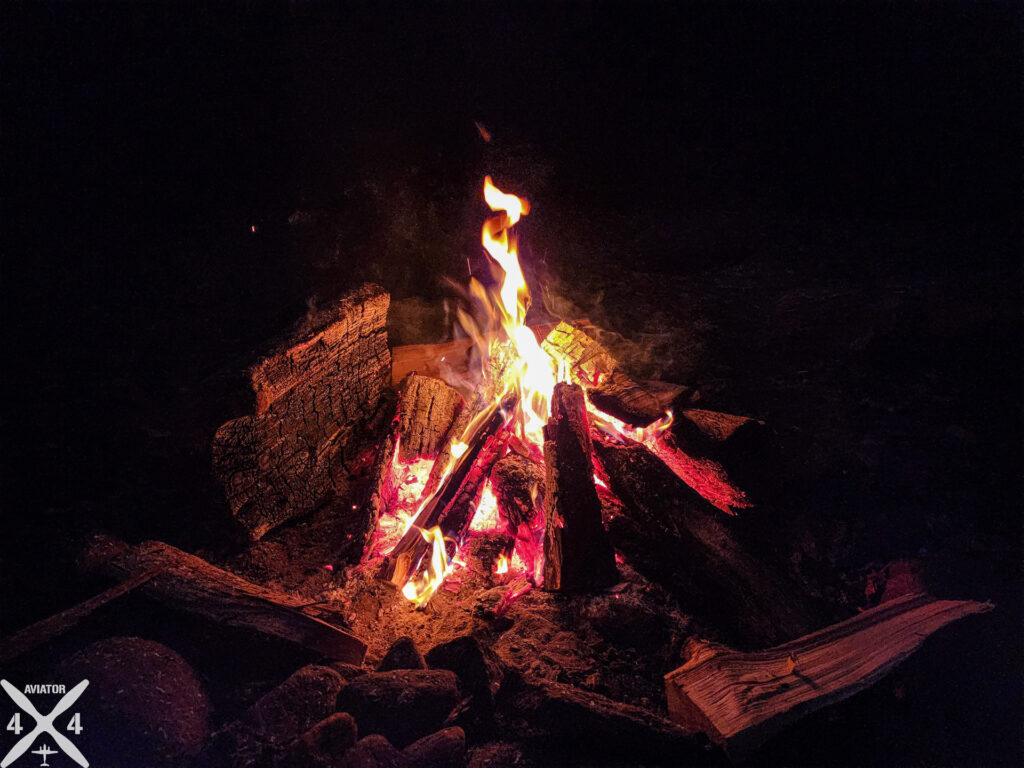Aviator Expedition1: The Outer Banks is a mild, low risk, offroad adventure but it was the perfect introduction.

In 2021 we spent 5 days on the Outer Banks of North Carolina. It was the first time I had taken the truck somewhere without fuel, grocery stores, or any kind of resupply available and it created a lasting impression: this was something I enjoyed and wanted to do more of. I have since taken several multi-thousand mile trips through WV, NC/TN, and FL, but it all started here.
Total Days:
- 5
Cumulative Distance:
- Total: 392.2mi
Enroute: 375mi
Objective Area: 17.2mi
Overall Difficulty:
2/10
Contributing Factors:
- Sugar Sand (Air Down Strongly Recommended)
- Unable to resupply without Ferry
Obligatory not affiliated with these companies, I bought all of this myself, none of it was provided to me, etc…
Gear Required:
- 4×4 Vehicle
- Food, water, and supplies to last duration of trip
Gear Recommended:
- Citronella mosquito repellant torches/candles.
- Bug spray ! Sun screen !
- Air Down Tool (Like the Grit Performance we used here and again in WV on AVEX2)
- X-Bull Traction Boards
- GCI Master Camp Table (Was super nice to have a sink at our basecamp)
- CLAM or other gazebo for shade, although CLAM helps with bugs
- Zero Gravity lounge chairs or similar
Lessons Learned:
- Modern 4 wheel drive systems are quite capable in sand.
- My truck needs heavier duty leaf springs to prevent rear sag when loaded.
- Sand. Gets. Everywhere.
- Screen gazebo for shade/bug protection is worth it.
Day 1 – Load up, ferry to island, setup basecamp

Time:
- 4.5hrs
Distance:
- 197mi
Difficulty:
2/10
Contributing Factors:
- Air Down Strongly Recommended
- Must time arrival for scheduled ferry
- Sugar Sand trails required to access parts of beach

After driving onto the ferry, we aired our tires down to ~20PSI with a Grit Performance Deflate Tool. First time using one, and it worked as expected. The case also contained spare valve stems, caps, and a valve stem tool which could be quite handy while exploring.

Off the ferry we got our pre-paid ORV stickers and set off to find a secluded spot. Parts of the beach were closed for turtle migration, forcing us to use the sugar sand access trails behind the beach which turned out to be pretty fun, and the trucks handled it like champs.

Eventually we found a spot and setup our basecamp from which we would relax and explore. The GCI Master Camp Table purchased for this trip turned out to be one of the stars of the camp, along with canopies for shade. We modified some Made in USA Igloo 6gal Water Jugs with new caps and stainless steel spigots to facilitate running sink water for dishes and hands.

Day 2 – Train with recovery equipment

Time:
- 1.5hrs
Distance:
- N/A
Difficulty:
2/10
Contributing Factors:
- Winches create incredible forces and must be respected
- Was difficult to get the truck buried in the sand; required all forms of traction control and assists turned off
Being the first trip of this sort for any of us, I wanted to try out the recovery gear and get some practice with the winch on my truck. It ended up taking a little bit to get the truck stuck in the sand, which was confidence inspiring. I had to disable all forms of stability/traction control, put it in 2wd, gear select M1, and step on the accelerator pretty hard to bury the rear. Then repeat in 4×4 for the front… Digging and putting the traction boards down almost took less time than to get stuck, and the truck easily climbed right out.
Following the traction boards, we setup a rear winch with snatchblock.
WARNING: DO NOT, UNDER ANY CIRCUMSTANCES, USE A TOW BALL FOR A REAR WINCH POINT. THIS CAN, AND HAS, KILLED PEOPLE.
Here is a very sad story, with pictures, about the death of a father trying to help a friend.
We anchored a Rhino 26k # Snatchblock using a 41k # Rhino D ring shackle on the Silverado’s rear hitch chain safety loop, which would be fine for the constant pull of a winch but not somewhere anyone should snatch/jerk from with a kinetic rope/strap. In hindsight we should have put a Rhino Shackle Hitch in the receiver instead to standardize training and minimize risk. We connected both of the front rated recovery points on the Colorado with an 8′ Rhino 31k # Tree Saver Strap to the 30′ 31k # Rhino strap from the shackle kit, and spooled the winch out as far as convenient.
In a real recovery we would spool out the winch as much as possible to get the greatest pulling strength, down to the last row on the drum. That, in conjunction with the 2x multiplier of every snatch block, creates an immense amount of pulling strength.
Day 3 – Cape Hatteras Lighthouse

Time:
- 0.5hrs
Distance:
- ~20mi round trip
Difficulty:
2/10
Contributing Factors:
- Air Down Strongly Recommended
- Sugar Sand trails required to access parts of beach

Day 4 – Beach camp and enjoy life

Time:
- All
Distance:
- N/A
Difficulty:
Negative five.
Contributing Factors:
- Beach
- Family
- Friends
- Fire
- Adult beverages
- Meat cooked over open flame

/divi
Day 5 – RTB; Ferry and drive home

Time:
- 4.5hrs
Distance:
- 197mi
Difficulty:
2/10
Contributing Factors:
- Air Up (There is free air at the Davis ferry)
- Sugar Sand trails required to access parts of beach
At the end of the trip we were all sad to leave, and promised to return, despite living covered in sand for 5 days. And by living covered in sand, I mean it was *everywhere*.
The truck got a nice vacuuming, seat shampooing, and foam cannon bath the next day with some Chemical Guys Honeydew Snow Foam

Lastly, this site contains affiliate links. It costs you nothing but I receive a small percentage if you purchase using the above links. I would greatly appreciate it if you would support the site using them, but if not I also understand. Thanks for reading, and may every landing be gear down !

















